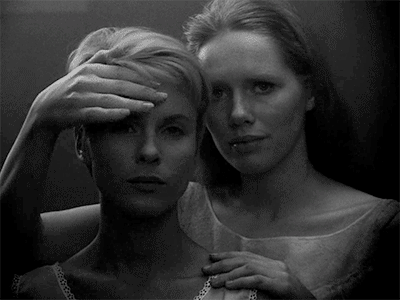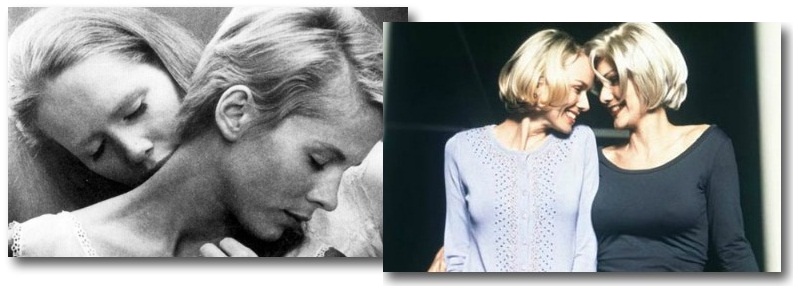
persona n 1: an actor's portrayal of someone in a play; 2: Jungian psychology A personal facade one presents to the world, a public image is "as fragile as Humpty Dumpty"
It would be a good idea to know the above definition before going into Ingmar Bergman's "Persona." One of the most influential films in cinematic history that is celebrating its 50th birthday today.
The film's opening is a kind of montage of cinema's earliest, most eeriest of work. It is meant as a statement for many things, which will be tackled soon, but let's first mention it as a proclamation of the tide changing. The cinema becoming something completely different, new and vital. Bergman shows us its history and how he is about to shatter the conventions are pave the way for a new language.
The two characters, Alma the Nurse (Andersson) and Elisabet Vogel (Ullmann), a stage actress, have very little in common. Their personas meld together in the most surreal kind of ways. This was "Mulholland Dr." before Betty and Rita
were even born.
Elizabeth is an actress that went mute halfway through a stage performance. Early on in the film we have a scene where her doctor presents the diagnosis of her condition.
Returning to the psychological, we fairly early on are confronted with a scene where Elizabeth’s doctor, in very straightforward terms, presents the diagnosis of her condition as being of her own choosing. She claims her choice to stop speaking is "sincere" and that, eventually with time, she will return to communicating with the world around her.
There are clues as to why she chose to stop speaking. Throughout the film we see Elizabeth looking at the disgust of the outside world through Television: Vietnam, the infamous Buddhist monk burning himself and images of the holocaust haunt her mind.

Based on the doctor's recommendation, Elizabeth is sent on a retreat and taken care of by Alma the nurse. The twist, and it's a complicated one that can't really be described thoroughly in just a line or two, is that their personalities merge and they become a sort of blend of each other. In the most iconic shot of the film both actresses faces merge with half of one face and half of the other blending to become one.
The film contains elements that strongly suggest a comparison between both female protagonists, and the peculiar elements of “twinning.” Bergman has even acknowledged that the idea for the film came from a meeting he had with Bibi Andersson and Liv Ullman and was triggered by how similar they were in appearance.
But the most important scene of the film might be one that is much less spoken of. Alma, at that point battling wits with the strong-headed Elizabeth, purposely leaves broken glass on the floor which cuts Elizabeth's foot. The moment cuts through the divide between the two women and reveals a weak person in Alma. The psychological battle both have been going through is revealed to be a victory for Elizabeth, despite the cut.
Why is this scene important? Because after this "victory" the screen goes black and that's where the film becomes a whole other beast. We are confronted back to where the film started and the eerie opening montage of cinema's earliest, most shocking works. This sequence mirrors exactly how the film started. As Roger Ebert so finely described it:
"
In both cases, a projector lamp flares to life, and there is a montage from the earliest days of the cinema: jerky silent skeletons, images of coffins, a hand with a nail being driven into it. The middle "break" ends with the camera moving in toward an eye, and even into the veins in the eyeball, as if to penetrate the mind."

Why is it such a victory for Elizabeth? Because she has proven to be the stronger character. A person proud of her beliefs and self-identity. Alma is the tonal opposite, a weak-minded woman that never fully grasped who she was. My favorite scene in the film is also one of the most erotically charged in the history of cinema. Alma recounts a day at the beach she had many years ago where she encounteed two men that pleasured her to orgasm. The imagery is so forcefully real that it's images still linger in my head many years later. That orgasm is the greatest and most intense feeling Alma ever had, also the most "real" she's ever felt in her life, everything else has been laborious and fake. Her self-identity has never found. Keeping that in mind can help one go through "Persona" shift to the surreal in its second half.
"Persona," just like many of David Lynch's films, is a psychological exercise.
Carl Jung’s concept of "Persona" was, in simple terms, the mask which we present to the world outside us, including others, which in turn represents a mix or in his words a compromise between the individual and society. In "Mulholland Drive" Betty and Rita switch identities, once the key enters the lock, in the last 45 minutes of the film and we enter Naomi Watts' mindset. The weak and the strong switching identities.

Although "Persona" has a similar technique once the foot is cut by glass and the screen goes black, the difference is that the identities don't switch. The psychological impact of "Persona" is that the strong invades the weak. We are thus in Alma's head for the remainder of the picture as she tries to fight her subconscious merging with Elizabeth's stronger identity. Heavy stuff, but some of the most fascinating and intriguing concepts ever put forth by a filmmaker.
50 years on "Persona" still seems to be ahead of its time, which is no small feat, and still seems to be the obsessions of many cinemagoers worldwide. There has never been anyone quite like Ingmar Bergman and there probably never will be.





